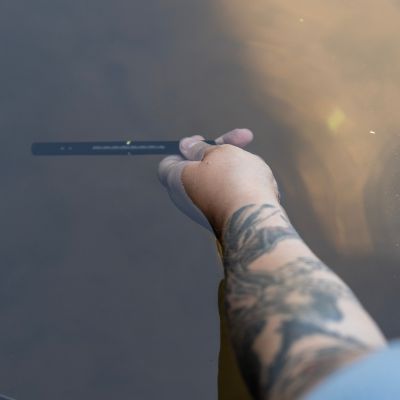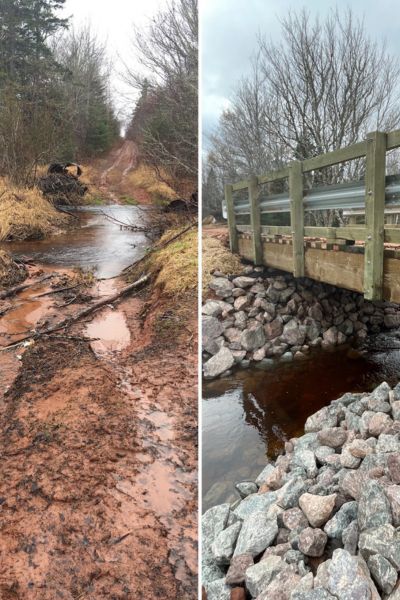Morell River watershed group helping fish and anglers

Morell River is a warm water system, which can be a challenge for two of PEI’s native fish: Atlantic salmon and brook trout, because they prefer cold water.
But the Morell River Management Cooperative (MRMC) (link is external) is helping the fish by keeping track of water temperatures and enhancing habitat for native species.
“Morell River can reach above 20 °C in the summer so we monitor the temperature because when that happens these native fish are going to seek out refuge and hang out in areas like springs,” says Hannah Murnaghan, MRMC coordinator.

The MRMC is committed to protecting the ecosystems in Morell and surrounding areas and Hannah and her team work hard to support this goal.
“We installed temperature loggers and dissolved oxygen loggers to get a better idea of the water quality in our watershed,” Murnaghan says.
“And we also have a remote temperature station on the Morell River that gives us real time temperature data that we post to our Facebook page (link is external) so people can log on and see what the river temperatures are at.”
This is important intel for anglers who use the temperature readings to make informed decisions about where to fish.
Trout are happiest in water between 13-18 ◦C. As the water temperature increases above 20 °C the amount of oxygen in the water decreases. Trout angled in warm water can quickly become exhausted and die.
When the river temperatures are high, it’s time to head to colder streams or take to the coastline to fish saltwater species such as mackerel and striped bass.
If river systems don’t post temperatures, it’s great to have a pocket thermometer in your fishing vest or tackle box.
Put the thermometer in the water a reasonable distance from the edge of the stream. Try and sample water temperature in the shade and out of direct sunlight. Make sure it is in moving water.
Leave the thermometer in the water for a minute or two and then read the results.
The watershed group can’t do much to control the rising water temperatures, but they are working hard on stream enhancement.
Murnaghan notes there was an old crossing at the Gill Road extension that washed out in the early 2000s. She says there were old culverts in the stream, and the bridge wasn’t rebuilt at the time. Over the years, it became a popular route for ATVs to use, and they had been driving through the river and creating ruts, causing sediment issues.
“So, our goal was to create a bridge that kept ATVs out of the stream and kind of restored the river back to its natural state. It was a great project to help better the habitat for Atlantic Salmon on the Morell River.”

That restoration project began in 2021 and was completed in collaboration with the provincial department of Transportation and Infrastructure, with help from the PEI Watershed Alliance and the Abegweit Conservation Society.
Murnaghan says we are lucky to live in Prince Edward Island that has beautiful and productive river systems and waterways.
“Island waterways are crucial for the livelihood of many residents, especially those who use a river like the Morell River to help feed their family.”
Working for a watershed group helps you gain a better appreciation for the river systems in PEI and the important work that watershed groups do to improve the water systems, Murnaghan says.
Anyone can get involved by volunteering. Contact your local watershed group through the PEI Watershed Alliance to find out how and get started (link is external).